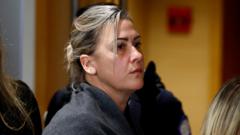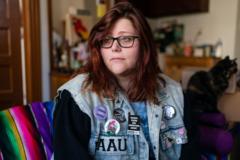In the wake of her mother, Gisèle Pelicot’s landmark trial that unveiled a decade of systematic abuse at the hands of Dominique Pelicot and a group of 50 other men, Caroline Darian finds herself battling her own demons. The trial, which captivated France and led to public accolades for Gisèle’s courage and resilience, left Caroline feeling abandoned and voiceless.
“I felt invisible,” Caroline, who is 46 and writes under a pen name, expressed during a recent dinner in Paris. Despite witnessing the convictions of her father and his co-defendants, her own truths—shrouded in pain and unanswered questions—remained unexamined. “My case, in that court, it was like it didn’t exist.”
Dominique Pelicot was charged for his brutal treatment of his wife, mixing drugs into her daily life to facilitate a grotesque cycle of abuse. The public trial allowed Gisèle to reclaim her narrative, turning her into a figure of hope and an advocate for countless other victims of sexual violence. While Gisèle found empowerment in the collective support of women rallying for justice outside the courthouse, her daughter felt a profound disconnection from that moment of triumph.
“My father was not held accountable for what he did to his daughter,” Caroline lamented, highlighting a gaping void left not only in the justice system but in her own healing journey. Unlike her mother’s experience, which drew national attention and activism, Caroline's narrative existed in the shadows—her own trauma rendered peripheral during the high-profile trial.
The epilogue of the public trial provided no closure for Caroline, who grapples with the harrowing memories of her father. As she seeks to assert her own claims of victimhood and reclaim her narrative, she stands at a crossroads marked by sorrow, uncertainty, and the pursuit of justice that, for her, remains elusive.




















